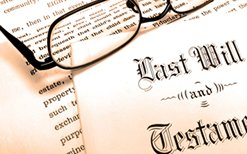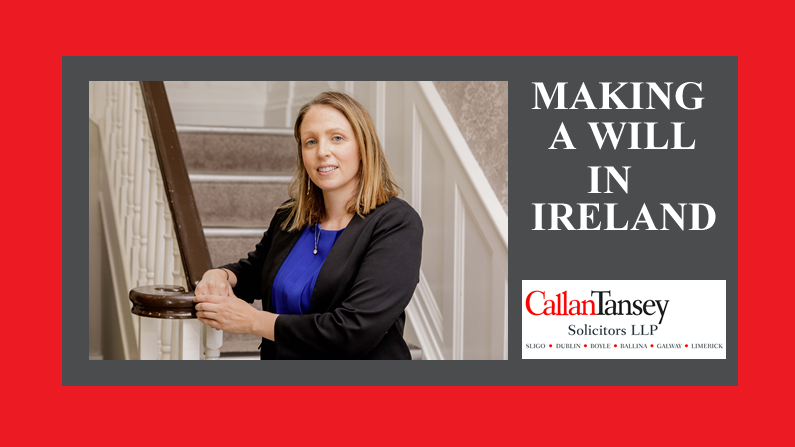One of the most important things you will do in your lifetime is to make a Will. There are many benefits of having a Will as well as negative consequences of dying without a Will. Here Joanne Leetch, Senior Associate Solicitor at CallanTansey Solicitors, addresses the questions that we are most frequently asked about making a Will
What is a Will?
 A will is a written document which contains a person’s wishes as to what is to happen to their property, money and personal belongings following their death. It may also contain directions about funeral arrangements, burial etc.,
A will is a written document which contains a person’s wishes as to what is to happen to their property, money and personal belongings following their death. It may also contain directions about funeral arrangements, burial etc.,
Why do you need a Will?
- To ensure that your property and assets pass to the person(s) you wish to benefit following your death.
- To protect those to whom you owe a legal and/or moral duty of care e.g. spouse, children or other dependants
- To provide an opportunity to minimise possible adverse tax consequences.
- To ensure that your affairs are administered by your chosen person (namely the Executor).
Who can make a Will?
A person who is over the age of 18 years or is married, or has been married, and is of sound mind.
What is required to make a Will?
A Will must be in writing and signed at the bottom by the person making the Will (i.e. the Testator) in the presence of two witnesses both of whom witness the Will in the presence of the Testator.
By either: –
- By executing a Codicil to the Will – this is a further written statement either by way of postscript or document to be attached to and read in conjunction with the original Will. The same rules regarding execution, as explained above, apply to the making of a Codicil.
- By making a new/fresh Will with the intention of revoking any previous Will.
Do you need a Solicitor when you are making a Will?
No, it is not necessary. However, it is advisable as
- A Solicitor will ensure compliance with the statutory provisions as set out above.
- A Solicitor will provide advice and guidance.
- A Solicitor can act as one of the witnesses of the Will (which can make it easier to have the Will admitted to Probate following death.)
What is A Grant of Probate?
This is the document which issues from The High Court Probate Office proving the Will and the appointment of the Executor. This document allow the Executor gather the assets of the deceased (e.g. Money in the bank), pay and debts or liabilities, sell assets if required (e.g. property) and ultimately divide and allocate the estate to those entitled in accordance with the Will.
What is an Executor?
The person named in the Will whom the Testator wants to execute his or her wishes.
What is an Enduring Power of Attorney?
This is a document in which a person authorises one, or a number of persons, to have the power to act on their behalf if at some stage in the future, that person ceases to have mental capacity.
What does capacity mean when making a Will?
The test is whether a person has functional capacity and are capable of giving instructions in relation to their wishes. In other words, do they understand:
- That they are making a Will that will deal with their estate on their death
- The nature and extent of their property and assets
- Those whom they wish to benefit (including those to whom they have a legal or other obligation)
Who determines capacity when making a Will?
The Solicitor has the primary obligation of determining capacity. The functional test referred to above is a legal test. However, a prudent Solicitor will, if appropriate, seek a report from the testator’s (the person making the Will) GP as to whether in his/her opinion the testator has capacity. The Solicitor will also make careful notes which together with the doctor’s report may assist in the easier extraction of a Grant of Probate.
What happens if I die without making a Will?
Your estate will pass to those entitled as prescribed by law (i.e. your next of kin). The rules of succession are set out in the Succession Act 1965. This may not be in accordance with your wishes.
Can making a Will help reduce inheritance tax?
The making of a Will itself does not necessarily help reduce inheritance tax. However, a person when making a Will can decide to their leave their assets in such a way to reduce inheritance tax. The advice of a Solicitor can be very helpful in this regard.
For further information, please contact Joanne Leetch at Callan Tansey Solicitors.


